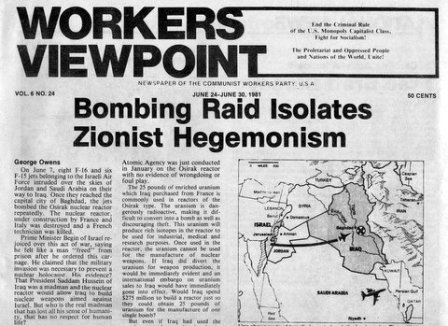
First Published: Workers Viewpoint, Vol. 6, No. 24, June 24-30,1981.
Transcription, Editing and Markup: Paul Saba
Copyright: This work is in the Public Domain under the Creative Commons Common Deed. You can freely copy, distribute and display this work; as well as make derivative and commercial works. Please credit the Encyclopedia of Anti-Revisionism On-Line as your source, include the url to this work, and note any of the transcribers, editors & proofreaders above.
Two thousand members of Britain’s Young Socialists met recently at the seaside resort of Bridlington for their annual conference. Singing the Internationale, the song of revolutionaries the world over, they shouted “Thatcher out! Out! Out!” between choruses. Among the slogans lining the walls inside the Spa Royal Hall was “Labor To Power With Socialist Policies.”
The Young Socialist (YS) are part of a left coalition of Trotskyite and Social Democratic groups that is demonstrating new muscle within Britain’s Labor Party. The YS has a seat on the Party’s 30-member executive body and their program calls for such things as full employment, a 35-hour work week, guaranteed annual minimum wage of $9,434, the creation of soldiers’ unions, free election of officers, and the forced retirement of all generals now on active duty.
According to political observers, coalition forces in the Labor Party number some 10,000 people. Although this is less than 5% of the Party’s total membership of 220,000, it has been enough to give the left more leverage than ever before. The coalition has influenced Labor’s national platform to include demands such as calling for Britain to pull out of the Common Market, unilateral nuclear disarmament, nationalizing all major British industry, and abolition of the House of Lords, Britain’s hereditary body of Parliament.
During the last year, the coalition was a big force behind rule changes that give the trade unions more power in choosing the Party leader. In local elections held in May, coalition candidates took London’s municipal administration and installed 35-year old Ken Livingstone as head of the Greater London Council.
Among the more well-known members of the coalition are:
*Tony Benn, a Member of Parliament (M.P.) from the Labor Party and an ex-Cabinet official. “Capitalism is a spent force,” says Benn, although he doesn’t call himself a Marxist. Benn defends Labor’s position on unilateral disarmament. “We do not believe that an American President, whom we did not elect and cannot remove, should have the power of peace and war by firing missiles from our airfields.”
*Arthur Scargill, president of the Yorkshire miners. He is a contender for the presidency of the National Union of Mineworkers next year. The 43-year old union official grew up in Yorkshire and met his wife at a Young Communist League debate in 1961. “The last Labor government failed to carry out basic socialist policies,” says Scargill. “It failed to impose a wealth tax, failed to abolish the House of Lords, failed to take into common ownership the means of production.” He is also critical of U.S. troops stationed in Europe. At the same time, Scargill blames the C.I.A. for instigating the workers’ rebellion in Poland. “They’re trying to overthrow socialism.”
*Ted Grant, head of the Militant Tendency, another of the groups within Labor’s left coalition. “When the Labor Party and trade unions are controlled by Marxists, a peaceful transformation of this country will be possible,” says the 67-year old Grant.
*Ted Knight, leader of London’s Lambeth borough Council. Knight was kicked out of the Labor Party in the mid-fifties for his activity in the Socialist Labor League, but was allowed back in the early 70’s.
Because of Labor’s left tilt, four former Party Cabinet ministers and a group of Labor M.P.’s split last February to form their own Social Democratic Party. This corning September Labor will hold its annual conference. At that time, members will decide who is to be the Party’s Deputy leader. The post is important for those who would position themselves to take on present Party leader Michael Foot, a moderate, at a later time. The top two candidates for Labor’s number two spot is the incumbent Dennis Healey, another moderate, and challenger Tony Benn. Benn’s support in the trade unions is supposedly concentrated at the shop steward level, while top union officials lean towards Healey.
Under the British political system, the party which wins the majority of seats in Parliament chooses the nation’s Prime Minister, usually the head of the party. The British people, angry over Thatcher’s economic policies, are turning their backs on her Conservative Party. Conservatives lost 23 of 54 counties to Labor in recent local elections. If Benn is successful in September, it may not be long before Labor has a chance to put its new program to work. Whether it will, remains to be seen.